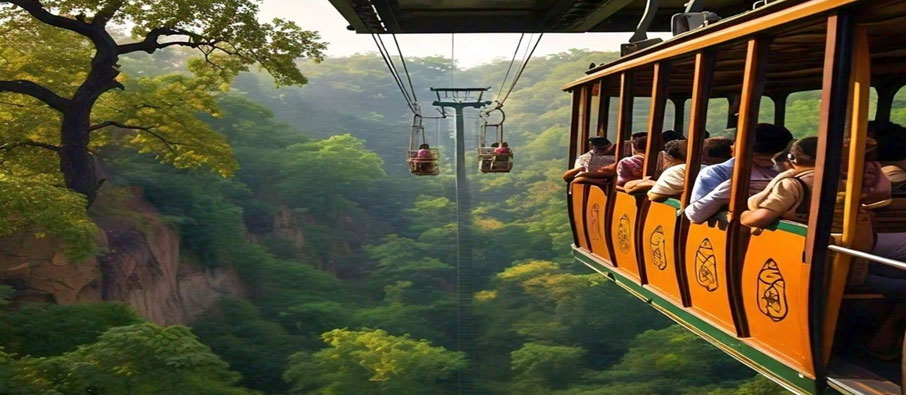Tadoba National Park Set to Introduce the World’s First Ropeway Safari

The Tadoba Andhari Tiger Reserve (TATR)., located in the Chandrapur district of Maharashtra, is set to begin a new chapter in wildlife tourism with the introduction of a first-of-its-kind ropeway safari. This undergoing project will be the world’s first ropeway system operating over a tiger reserve, providing visitors with an unparalleled opportunity to explore the forest with a bird’s eye view. The aerial perspective will allow wildlife enthusiasts to spot tigers and other animals in their natural habitats while minimising environmental disruption and ensuring a tranquil experience.
The ropeway safari, proposed by the renowned French company POMA SAS, aims to complement the tiger reserve’s traditional jeep safaris by offering a panoramic, 360-degree view of the landscape. POMA SAS, known for its innovative ropeway systems in Patnitop, Jammu and Kashmir, and Mussoorie, Uttarakhand, now seeks to introduce this eco-friendly solution across Tadoba’s vast 625.4 sq. km. This project is designed to offer a serene and sustainable exploration of Tadoba National Park's rich biodiversity, enabling visitors to witness wildlife from new vantage points without disturbing their natural behaviours.
In effect from a recent event, Public Affairs Director and Head of Sales for Asia at POMA SAS, Benjamin Fauchier Delavigne, presented the project proposal to Devendra Fadnavis, Maharashtra’s Deputy Chief Minister. Delavigne emphasised that the ropeway system has been meticulously designed to blend seamlessly with the environment, ensuring minimal noise and disturbance to the wildlife. “Our goal is to provide an immersive wildlife experience that allows visitors to observe animals from multiple perspectives without creating noise or disturbances on the ground,” he explained.
Maharashtra’s government has expressed its strong support for the initiative, viewing it as an excellent opportunity to boost tourism while maintaining environmental integrity. Deputy Chief Minister Fadnavis emphasised the importance of aligning the project with environmental guidelines and stated that the tourism and forest departments would conduct thorough evaluations to ensure compliance. “Our objective is to expedite the project’s implementation while strictly adhering to guidelines that protect the park’s delicate ecosystem,” he noted.
The ropeway's pollution-free operation is expected to play a vital role in preserving the reserve’s ecological balance. As highlighted by Prasanna Mohile, National President of Pernod Ricard, who facilitated the project’s progress, the ropeway will not only reduce the ecological impact but also generate local employment opportunities. The initiative aligns with Maharashtra’s tourism policy, which encourages innovative ecotourism ventures, further reinforcing Nagpur’s status as the “Tiger Capital” and promoting sustainable tourism in the region.
Upon receiving final approval, the ropeway safari will mark a new milestone in wildlife tourism, providing visitors with a unique and immersive way to experience the forest. With its quiet operation and aerial views, the project ensures that animals can continue to roam undisturbed while offering tourists an extraordinary safari experience. This pioneering initiative is expected to set a benchmark for wildlife tourism worldwide, balancing tourism growth with environmental conservation and demonstrating how innovative solutions can coexist with ecological preservation.